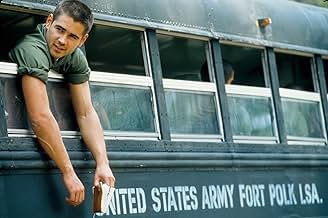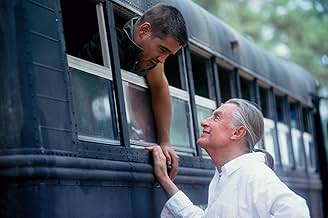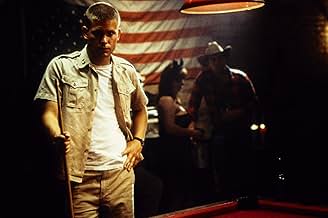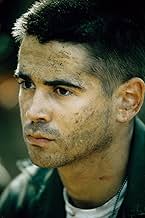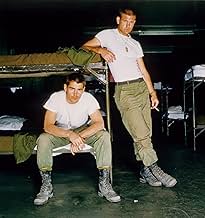IMDb-BEWERTUNG
6,9/10
44.708
IHRE BEWERTUNG
Eine Gruppe von Rekruten durchläuft ein fortgeschrittenes Infanterie-Training in Fort Polk, Louisianas berüchtigtem Tigerland, der letzten Station vor Vietnam für Zehntausende junger Männer ... Alles lesenEine Gruppe von Rekruten durchläuft ein fortgeschrittenes Infanterie-Training in Fort Polk, Louisianas berüchtigtem Tigerland, der letzten Station vor Vietnam für Zehntausende junger Männer im Jahr 1971.Eine Gruppe von Rekruten durchläuft ein fortgeschrittenes Infanterie-Training in Fort Polk, Louisianas berüchtigtem Tigerland, der letzten Station vor Vietnam für Zehntausende junger Männer im Jahr 1971.
- Regie
- Drehbuch
- Hauptbesetzung
- Auszeichnungen
- 2 Gewinne & 5 Nominierungen insgesamt
Tom Guiry
- Pvt. Cantwell
- (as Thomas Guiry)
James MacDonald
- Staff Sgt. Thomas
- (as James McDonald)
Empfohlene Bewertungen
American military authority is the enemy for Pvt. Roland Bozz (Colin Farrell), a nonconformist trainee who, along with other infantry trainees, endures brutal, sadistic treatment in preparation for combat in Vietnam. Tigerland is a swampy, steamy camp near Fort Polk, Louisiana that is supposed to simulate conditions in Vietnam. The story is set in 1971.
The amount and severity of physical and verbal aggression displayed in this film may be a tad overstated. But the point the film is making is that many, if not most, of the young guys drafted into the army in the late 60s and early 70s absolutely did not want, or deserve, to be there.
Roland Bozz is one of those young men. He's angry at the war, angry at the army. The army won't release him because they know that's what he wants. If Bozz can't get himself out, the next best thing is to try and get other recruits out. That will be his revenge, his way to fight the system.
A fellow trainee shares his background with Bozz, who then tells the trainee: "I know army regulations the way prisoners know the law. You're a hardship discharge, man, if ever I saw one. Okay. I'll get you out of the army". Bravo for Roland Bozz, a young rebel with a mission, a cause, trapped like the others by an oppressive, controlling institution.
Acting is very, very good. Colin Farrell is terrific, at a time when he, and the rest of the cast, was largely unknown. No need for overpaid A-list actors. The film's acting style trends naturalistic, spontaneous, and emotionally intense. None of the acting seems forced.
With a hand-held camera, combined with grainy film stock, and using quick zooms and unexpected cuts, the cinematography and editing convey a documentary look and feel, which results in sequences that are quite realistic. Lighting is mostly natural. Sets are plain and unadorned. Background music is minimal.
Much better than I ever expected, "Tigerland" is a well-made film with an intense, anti-war theme. It's about putting others ahead of one's own selfish interest. That Hollywood largely shunned this low-budget film is all the more reason to see it.
The amount and severity of physical and verbal aggression displayed in this film may be a tad overstated. But the point the film is making is that many, if not most, of the young guys drafted into the army in the late 60s and early 70s absolutely did not want, or deserve, to be there.
Roland Bozz is one of those young men. He's angry at the war, angry at the army. The army won't release him because they know that's what he wants. If Bozz can't get himself out, the next best thing is to try and get other recruits out. That will be his revenge, his way to fight the system.
A fellow trainee shares his background with Bozz, who then tells the trainee: "I know army regulations the way prisoners know the law. You're a hardship discharge, man, if ever I saw one. Okay. I'll get you out of the army". Bravo for Roland Bozz, a young rebel with a mission, a cause, trapped like the others by an oppressive, controlling institution.
Acting is very, very good. Colin Farrell is terrific, at a time when he, and the rest of the cast, was largely unknown. No need for overpaid A-list actors. The film's acting style trends naturalistic, spontaneous, and emotionally intense. None of the acting seems forced.
With a hand-held camera, combined with grainy film stock, and using quick zooms and unexpected cuts, the cinematography and editing convey a documentary look and feel, which results in sequences that are quite realistic. Lighting is mostly natural. Sets are plain and unadorned. Background music is minimal.
Much better than I ever expected, "Tigerland" is a well-made film with an intense, anti-war theme. It's about putting others ahead of one's own selfish interest. That Hollywood largely shunned this low-budget film is all the more reason to see it.
This movie is done on a low budget. It looks like they used the actual government training center, and many parts were realistic. A few parts of the movie were over the top. This movie is fresh, and gritty; I like the realism of the film. The hero or anti hero is a nice guy, in wolf's skin. (I've met people like him) It shows how cruel the system can be and the merits of playing by your own rules. In the end I like this film.
While it was filmed at a Florida National Guard site, "Tigerland" totally reminded me of Fort Polk, LA., firing ranges, maneuver areas, waist-deep water and all. The movie was fairly authentic and the characters similar to those same ones at my AIT in 1974. The difference between the Tigerland year, 1971, and mine of 1974 is all the drill sergeants and instructors knew they weren't going back to Vietnam, as it was pretty much all over, so training was very relaxed - not a challenge at all. That was the precursor to all our troubles in the 70s and 80s, which I know for a fact as I stayed in until 2004. I never heard anyone mention "Tigerland" but the Army did have realistic Vietnam training villages at different bases across the U.S. Vietnam Vets tell me that up to 1972 Basic & AIT could be pretty rough and rugged, because the trainers had been there and were mandated to train Vietnam-bound men those skills to make it, although that was not always the case. Both a drill sergeant at Polk and later one of my Vietnam Vet NCOs, when we had become instructors at a basic training brigade at Fort Bliss, told me there was nothing they could do to get anyone ready and people just had to find out and figure out for themselves. This movie rates high.
I thoroughly enjoyed this movie, but it is nothing new.
Everyone here is grouping it with other war movies, this movie has been miscategorized! Its not a war movie any more than "One flew over the cuckoos nest" is a asylum movie or "Cool Hand Luke" is a prison movie. This is a movie about individuality, nonconformity, self-confidence and the costs of that personality type.
The plot is the same as "One flew over the Cuckoos nest" and "Cool Hand Luke", its in GOOD company, and it holds its own. Its these movies it should be held up against and compared, not "Apocalypse Now" or "Platoon".
Eric
Everyone here is grouping it with other war movies, this movie has been miscategorized! Its not a war movie any more than "One flew over the cuckoos nest" is a asylum movie or "Cool Hand Luke" is a prison movie. This is a movie about individuality, nonconformity, self-confidence and the costs of that personality type.
The plot is the same as "One flew over the Cuckoos nest" and "Cool Hand Luke", its in GOOD company, and it holds its own. Its these movies it should be held up against and compared, not "Apocalypse Now" or "Platoon".
Eric
TIGERLAND
Aspect ratio: 1.85:1
Sound format: Dolby Digital
Louisiana, 1971: During basic training, a rebellious army conscript (Colin Farrell) causes dissension within the ranks.
Given Joel Schumacher's reputation as a schlockmeister par excellence, most critics were caught off-guard by this low-budget drama, filmed without any of the frills and fripperies normally associated with Hollywood blockbusters, and headlined by little more than obscure (but hugely experienced) character actors and talented newcomers, including Farrell, whose bravura performance launched him to international stardom. Far removed from the extravagant Vietnam-operas favored by Francis Ford Coppola and Oliver Stone, Schumacher's film examines the contradictions of war and the dehumanizing effect of combat on ordinary men through the experiences of Farrell's anti-hero, a compassionate man who despises the self-serving patriotic nonsense peddled by his superiors, and who refuses to compromise his own ideals, despite the sometimes painful repercussions of his disobedience.
Though backed by a major studio, TIGERLAND has the look and feel of a low-budget indie production, using hand-held camera-work and grainy film-stock for documentary effect, and this uncompromising 'Dogme'-like approach allows Schumacher to focus his attention on the characters and their situation rather than the pyrotechnics which usually dominate such movies. Farrell may be the star of the show, but he's matched by debut actor Matthew Davis (BLOODRAYNE) as his closest friend and fellow combatant, an aspiring writer who volunteered for duty and who favors intellect and reason over Farrell's reckless bravado. Fine supporting cast, excellent technical credits.
Aspect ratio: 1.85:1
Sound format: Dolby Digital
Louisiana, 1971: During basic training, a rebellious army conscript (Colin Farrell) causes dissension within the ranks.
Given Joel Schumacher's reputation as a schlockmeister par excellence, most critics were caught off-guard by this low-budget drama, filmed without any of the frills and fripperies normally associated with Hollywood blockbusters, and headlined by little more than obscure (but hugely experienced) character actors and talented newcomers, including Farrell, whose bravura performance launched him to international stardom. Far removed from the extravagant Vietnam-operas favored by Francis Ford Coppola and Oliver Stone, Schumacher's film examines the contradictions of war and the dehumanizing effect of combat on ordinary men through the experiences of Farrell's anti-hero, a compassionate man who despises the self-serving patriotic nonsense peddled by his superiors, and who refuses to compromise his own ideals, despite the sometimes painful repercussions of his disobedience.
Though backed by a major studio, TIGERLAND has the look and feel of a low-budget indie production, using hand-held camera-work and grainy film-stock for documentary effect, and this uncompromising 'Dogme'-like approach allows Schumacher to focus his attention on the characters and their situation rather than the pyrotechnics which usually dominate such movies. Farrell may be the star of the show, but he's matched by debut actor Matthew Davis (BLOODRAYNE) as his closest friend and fellow combatant, an aspiring writer who volunteered for duty and who favors intellect and reason over Farrell's reckless bravado. Fine supporting cast, excellent technical credits.
Wusstest du schon
- WissenswertesThe actors had no trailers, make-up artists, hairstylists, chairs or any of the typical luxuries.
- PatzerWhen Bozz brings the truck to a screeching halt with the can in the exhaust pipe, a modern clear plastic water bottle rolls across the truck floor.
- SoundtracksSound Off
Written by Willie Lee Duckworth and Bernard Lentz
Top-Auswahl
Melde dich zum Bewerten an und greife auf die Watchlist für personalisierte Empfehlungen zu.
Details
Box Office
- Budget
- 10.000.000 $ (geschätzt)
- Bruttoertrag in den USA und Kanada
- 139.692 $
- Eröffnungswochenende in den USA und in Kanada
- 26.715 $
- 8. Okt. 2000
- Weltweiter Bruttoertrag
- 148.701 $
- Laufzeit
- 1 Std. 41 Min.(101 min)
- Farbe
- Sound-Mix
- Seitenverhältnis
- 1.85 : 1
Zu dieser Seite beitragen
Bearbeitung vorschlagen oder fehlenden Inhalt hinzufügen




